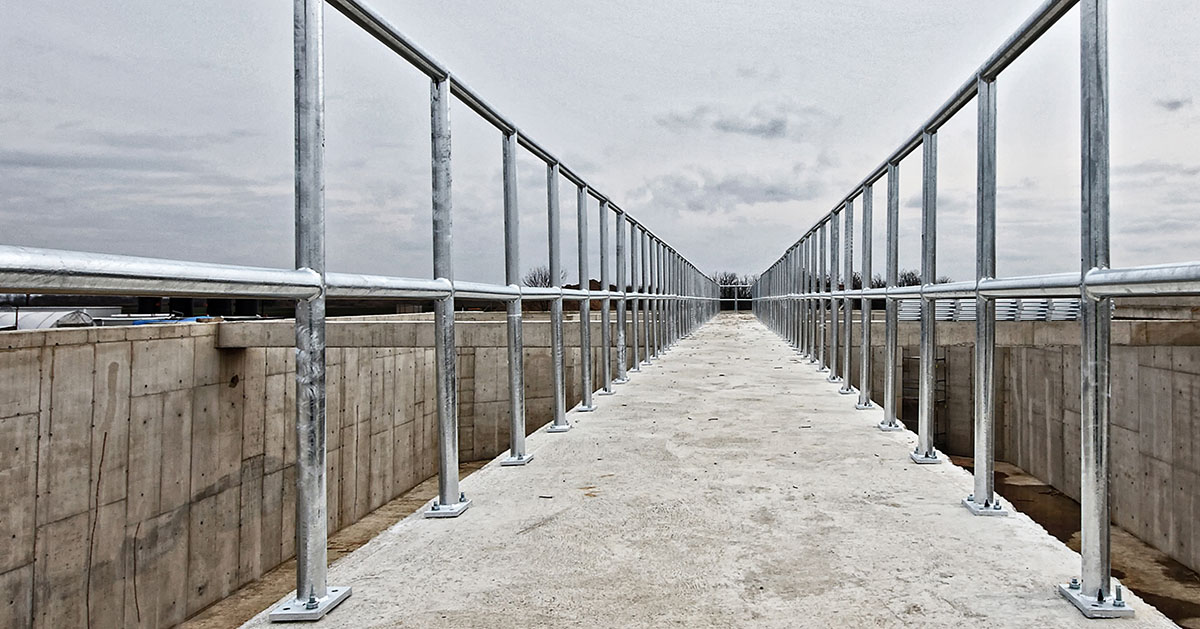“I am not scared of heights, I’m scared of falling.”
– Anonymous
While we can’t do much to help someone with a fear of heights (acrophobia), safety railing installed by Tennessee Roofing & Construction can go a long way to alleviate the fear of falling (basophobia) and reduce liability to companies.
The Many Uses of Safety Railing
 Our safety railing systems include guardrails and barricades, as found atop commercial and public buildings. It just makes sense to add some perimeter protection to prevent someone from accidentally falling from a roof onto lower levels. This is always a risk on roof edges, but can also happen along fixed stairs, ramps, walkways, and platforms.
Our safety railing systems include guardrails and barricades, as found atop commercial and public buildings. It just makes sense to add some perimeter protection to prevent someone from accidentally falling from a roof onto lower levels. This is always a risk on roof edges, but can also happen along fixed stairs, ramps, walkways, and platforms.
Safety railing discourages people from going places that aren’t safe for them to go or spots where they have no compelling need to access. Railing only makes for safer rooftops but also protects workers and machinery from warehouse traffic, directs the flow of movement on pedestrian walkways, serves as fencing, and offers weight-bearing support and ADA compliance for those with mobility issues.
Reduce Fall Hazards — And Liability for Accidents
Skylight fall protection also needs to be factored into overall rooftop safety rail system designs since these translucent screens constructed of glass or plastic allow light to shine through, but they are typically not made to absorb the weight of a falling person. Although they are designed to allow only light to pass through, OSHA actually considers these to be holes in a rooftop because of the falling risk. It’s easy to imagine the damage that could happen if someone on the roof fell through a skylight and impacted on a hard concrete surface from a distance of a couple of dozen feet.
Unprotected edges impact your company’s liability, which could easily get quite costly if something happens and an employee or visitor gets hurt. This is why regulations require work areas near a roof edge be protected with a barrier. As a lawyer will tell you if someone goes around a guardrail or barricade, then attempts to sue following an incident, they’re forced to confront and account for at least some responsibility for placing themselves in that situation while the court must acknowledge a company took reasonable action to prevent harm for occurring.
Things to Remember When Installing Safety Railing Systems
To realize these legal safeguards, of course, the systems installed must be up to code and not create a false sense of security. You want solutions made to last as long as your building does.
When installing safety railing systems, it’s absolutely critical that they be sturdy and durable so they offer long-term protection. These need to be regularly examined as part of routine roofing inspections like the ones offered by Tennessee Roofing & Construction. Using materials manufactured to resist corrosion while exposed to a range of weather conditions year-round ensures greater longevity. It’s important to factor this into decisions when comparing prices from various contractors for safety railing installation.
Also vital is that safety railing systems comply with OSHA and ANSI Fall Protection requirements, as well as occupational health laws. Written or electronic records of inspection should be kept on file during the service life of the product. Training on fall protection may be required in addition to the standards and regulations. It is generally a good idea for businesses to schedule safety events to raise awareness of the hazard of falling from elevations and to review fall protection requirements.
Tennessee Roofing & Construction works with clients to make sure railing we design and install meets the codes and project needs.
Flexibility Also Important in Railing Systems
A number of factors go into designing and building a safety rail system. Cost and styling are two of the most important considerations.
The best railing systems do not compromise the architectural appeal of a building and offer some flexibility to install around existing roof obstacles. These systems do not necessarily have to be complicated or offer complete perimeter production; protecting designated core areas while designating safe working areas may be a viable solution.
As general contractors, Tennessee Roofing & Construction can incorporate the design of safety railings and barriers into a new commercial or industrial construction project or add these to existing buildings.
The first step is arranging for the experts from Tennessee Roofing & Construction to visit your site and identify fall protection hazards so we can design complete solutions that ensure both stability and protection. We are here to help you keep your employees safe. Call us at (423) 842-8826 and let’s discuss your fall protection options. Learn more about our Safety Railing Systems.
Photo: © Milos Stojanovic / 123RF Stock Photo
Blog © 2019 Tennessee Roofing & Construction | Hixson, TN 37343


